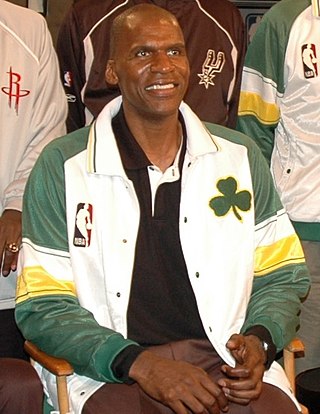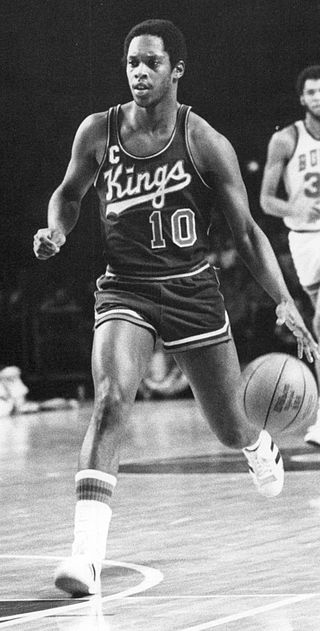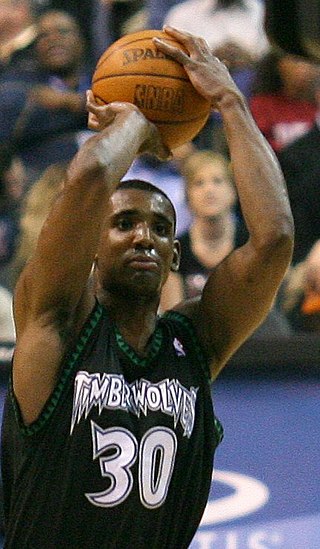
Robert Allen McAdoo Jr. is an American former professional basketball player and coach. He played 14 seasons in the National Basketball Association (NBA), where he was a five-time NBA All-Star and named the NBA Most Valuable Player (MVP) in 1975. He won two NBA championships with the Los Angeles Lakers during their Showtime era in the 1980s. In 2000, McAdoo was inducted into the Naismith Basketball Hall of Fame. He was named to the NBA 75th Anniversary Team in 2021.

Robert Lee Parish is an American former professional basketball player. A 7'1" center, nicknamed "the Chief", Parish played for four teams in the National Basketball Association (NBA) from 1976 to 1997. During his 14-year tenure with the Boston Celtics, Parish teamed with Hall-of-Fame forwards Larry Bird and Kevin McHale to form one of the greatest front lines in NBA history.

Alexander Murray Hannum was a professional basketball player and coach. Hannum coached two National Basketball Association (NBA) teams and one American Basketball Association (ABA) team to league championships. He had a combined NBA-ABA record of 649–564 (.535) in the regular season and 61–46 (.570) in the playoffs over 16 seasons. In 1998, he was inducted into the Naismith Memorial Basketball Hall of Fame as a coach.

Nathaniel "Tiny" Archibald is an American retired professional basketball player. He spent 14 years playing in the National Basketball Association (NBA), most notably with the Cincinnati Royals/Kansas City–Omaha Kings and Boston Celtics. In 1991, he was enshrined into both the Naismith Memorial Basketball Hall of Fame and the New York City Basketball Hall of Fame.

William Walton Sharman was an American professional basketball player and coach. He is mostly known for his time with the Boston Celtics in the 1950s, partnering with Bob Cousy in what was then considered the greatest backcourt duo of all time. As a coach, Sharman won titles in the ABL, ABA, and NBA, and is credited with introducing the now-ubiquitous morning shootaround.

Samuel Jones was an American professional basketball player who was a shooting guard for the Boston Celtics in the National Basketball Association (NBA). A five-time NBA All-Star, he was nicknamed "Mr. Clutch" and "the Shooter" for his quickness and game-winning shots, especially during the NBA playoffs. Jones has the second most NBA championships of any player (10), behind only his teammate Bill Russell (11). He was also one of only three Celtics to be part of each of the Celtics' eight consecutive championships from 1959 to 1966. Jones is a member of the Naismith Memorial Basketball Hall of Fame.
The 1980 NBA draft was the 34th annual draft of the National Basketball Association (NBA). The draft was held on June 10, 1980, at the Sheraton Centre Hotel & Towers, before the 1980–81 season. In this draft, 23 NBA teams took turns selecting amateur U.S. college basketball players and other eligible players, including international players. The first two picks in the draft belonged to the teams that finished last in each conference, with the order determined by a coin flip. The Boston Celtics, who obtained the Detroit Pistons' first-round pick in a trade, won the coin flip and were awarded the first overall pick, while the Utah Jazz were awarded the second pick. The Celtics then traded the first pick to the Golden State Warriors before the draft. The remaining first-round picks and the subsequent rounds were assigned to teams in reverse order of their win–loss record in the previous season. An expansion franchise, the Dallas Mavericks, took part in the NBA Draft for the first time and were assigned the eleventh pick in each round. A player who had finished his four-year college eligibility was automatically eligible for selection. Before the draft, five college underclassmen announced that they would leave college early and would be eligible for selection. The draft consisted of 10 rounds comprising the selection of 214 players. This draft has the distinction of being the first NBA Draft to be televised.
The 1979 NBA draft was the 33rd annual draft of the National Basketball Association (NBA), held at the Plaza Hotel in New York City on Monday, June 25. In this draft, the 22 NBA teams took turns selecting amateur U.S. college basketball players and other eligible players, including international players; it went ten rounds and selected 202 players.
The 1997 NBA draft took place on June 25, 1997, at Charlotte Coliseum in Charlotte, North Carolina. The Vancouver Grizzlies had the highest probability to win the NBA draft lottery, but since they were an expansion team along with the Toronto Raptors they were not allowed to select first in this draft. Although the Boston Celtics had the second-worst record in the 1996–97 season and the best odds of winning the lottery with two picks, the Spurs lost David Robinson and Sean Elliott to injury early in the season, finished with the third-worst record, and subsequently won the lottery. Leading up to the draft, there was no doubt that Tim Duncan would be selected at No. 1 by the Spurs as he was considered to be far and away the best prospect. After Duncan, the rest of the draft was regarded with some skepticism. The Celtics had the third and sixth picks, selecting Chauncey Billups and Ron Mercer, both of whom were traded in the next two years.

Mark D. Blount is an American retired professional basketball center with four teams in the National Basketball Association between 2000 and 2009.

Joseph Henry White was an American basketball player. As an amateur, he played at the University of Kansas, where he was named a second-team All-American twice. White was part of the U.S. men's basketball team during the 1968 Summer Olympics, winning a gold medal with the team.
Christopher Joseph Ford was an American professional basketball player and head coach in the National Basketball Association (NBA). Nicknamed "The Mad Bomber", Ford played most of his NBA career on the Detroit Pistons, before finishing his playing career at the Boston Celtics. In the Celtics' season opener in 1979–80, he was credited with making the first official three-point shot in NBA history. He won an NBA championship with the Celtics in 1981.
Garfield Heard is an American retired professional basketball player and coach. He played collegiately at the University of Oklahoma and was selected by the Seattle SuperSonics in the third round of the 1970 NBA draft. He had a 15-year NBA career for four teams: the Sonics, the Buffalo Braves, the Chicago Bulls, and the Phoenix Suns. Heard is best known for a buzzer beater he made to send Game 5 of the 1976 Phoenix–Boston championship series into a third overtime. This feat is commonly known as "The Shot", or "The Shot Heard 'Round the World", in reference to Ralph Waldo Emerson's poem "Concord Hymn", which was written about the Battle of Lexington.
Sidney Wicks is an American former professional basketball player in the National Basketball Association (NBA). A native of California, he played college basketball for the UCLA Bruins. Wicks was selected by the Portland Trail Blazers in the 1971 NBA draft with the second overall pick. He was named the NBA Rookie of the Year and was a four-time NBA All-Star with the Trail Blazers. He also played professionally for the Boston Celtics and San Diego Clippers, finishing his career after one season in Italy.
The 1972 NBA draft was the 26th annual draft of the National Basketball Association (NBA). The draft was held on April 10 and 15, 1972 before the 1972–73 season. In this draft, 17 NBA teams took turns selecting amateur U.S. college basketball players and other eligible players, including international players. The first two picks in the draft belonged to the teams that finished last in each conference, with the order determined by a coin flip. The Portland Trail Blazers won the coin flip and were awarded the first overall pick, while the Buffalo Braves were awarded the second pick. The remaining first-round picks and the subsequent rounds were assigned to teams in reverse order of their win–loss record in the previous season. As a result of last year's supplemental hardship draft, the Cincinnati Royals, the Atlanta Hawks, the Golden State Warriors and the Baltimore Bullets forfeited their first-round picks, while the Los Angeles Lakers forfeited their fourth round pick. Prior to the start of the season, the Cincinnati Royals relocated and became the Kansas City-Omaha Kings. The draft consisted of 18 rounds comprising the selection of 198 players.
Douglas Smith is an American former professional basketball player. He was selected by the Dallas Mavericks as the sixth overall pick in the 1991 NBA draft.

Hubert "Hugh" Evans was an American basketball referee in the National Basketball Association (NBA) for 28 seasons. He worked 1,969 regular season NBA games and 35 NBA Finals games during his NBA officiating career from 1972 to 2001. He subsequently served as an assistant supervisor of officials in the NBA front office.
Stephen Phil Kuberski is an American former professional basketball player. Kuberski won two NBA titles with the Boston Celtics, in 1974 and 1976 and had a nine-year National Basketball Association (NBA) career. Kuberski was the last Celtic to wear number 33 before Larry Bird.
The 1994–95 NBA season was the 49th season for the Boston Celtics in the National Basketball Association. This was the Celtics' first season since the 1979–80 season without long-time center Robert Parish, who left as a free agent to the Charlotte Hornets. It was also the team's final season of play at the Boston Garden, as well as playing occasional home games at the Hartford Civic Center in Hartford, Connecticut. After missing the playoffs the previous season, the Celtics had the ninth overall pick in the 1994 NBA draft, and selected Eric Montross from the University of North Carolina. Prior to the season, the Celtics signed free agent All-Star forward Dominique Wilkins, signed free agents Pervis Ellison, second-year guard David Wesley and rookie guard Greg Minor, and acquired Blue Edwards and Derek Strong from the Milwaukee Bucks.
The 1995–96 NBA season was the 50th season for the Boston Celtics in the National Basketball Association. A new era began for the Celtics as they moved into their current home, a state of the art new arena then known as the "Fleet Center". In addition, this also ended their practice of playing occasional home games at the Civic Center in Hartford, Connecticut. The Celtics had the fourteenth overall pick in the 1995 NBA draft, and selected Eric Williams out of Providence College. There was much speculation during the previous off-season over who would coach the team after the firing of Chris Ford, with candidates that included former Celtics coaches Dave Cowens and K. C. Jones, and even former Celtic player Paul Silas. Ultimately, General Manager M. L. Carr decided to hire himself as the team's new head coach. The Celtics also signed free agent and former Boston College star Dana Barros, who won the Most Improved Player award the previous season with the Philadelphia 76ers.








